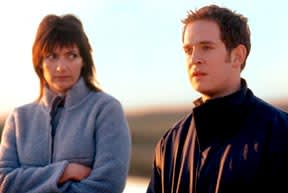It's no longer new telling a story from multiple viewpoints, so the structure of Lawless Heart can't entice us with any lawlessness in narrative style. Consequently, the success with which writer/directors Neil Hunter and Tom Hunsinger handle this form is the measure of their work. Technical prowess in several areas makes it quite a lovely chamber piece.
Opening with the funeral of Stuart, the aftermath is revealed through the eyes of his partner Nick, Tim (an old friend returning after eight years only to learn of the death) and Dan (the husband of Stuart's sister, Judy). Actors Tom Hollander (Nick), Douglas Henshall (Tim) and Ellie Haddington (Judy) texture their roles with British intensity. The colours are saturated, the camera work glancing and nervous, or limpid, establishing a tone that is simultaneously gritty (re: small towns and death) and elegiac (re: small towns and mourning). The transitions from one character's point of view to another are beautifully dreamy, initially reading as flashback before each transition is subtly revealed.
The selection of the three main characters is troublesome however, since in such an arbitrary structure the choices must be so perfect as to feel inevitable. Dan is the focus of part one and yet Judy is more compelling and closely connected to the diseased. Obviously, Dan is at sea, but despite his gormlessness he attracts the attentions of an attractive French florist and his clumsy responses are in a comic style that is out of place. Nick's section also requires suspended belief regarding personalities and relationships, but Tim's story in the third part finally hits the right human tone of trial and error.
For its denouement they all sit down to watch home movies of Stuart. A Schubert trio sounds from nowhere, you know, home movies, classical strings, Pavlovian response, tears. Just as quickly the perfectly apposite original score returns, as though someone suddenly realised what a cheap trick that was. These are the kinds of irritants that keep Lawless Heart from being all heart. (Lions Gate)
Opening with the funeral of Stuart, the aftermath is revealed through the eyes of his partner Nick, Tim (an old friend returning after eight years only to learn of the death) and Dan (the husband of Stuart's sister, Judy). Actors Tom Hollander (Nick), Douglas Henshall (Tim) and Ellie Haddington (Judy) texture their roles with British intensity. The colours are saturated, the camera work glancing and nervous, or limpid, establishing a tone that is simultaneously gritty (re: small towns and death) and elegiac (re: small towns and mourning). The transitions from one character's point of view to another are beautifully dreamy, initially reading as flashback before each transition is subtly revealed.
The selection of the three main characters is troublesome however, since in such an arbitrary structure the choices must be so perfect as to feel inevitable. Dan is the focus of part one and yet Judy is more compelling and closely connected to the diseased. Obviously, Dan is at sea, but despite his gormlessness he attracts the attentions of an attractive French florist and his clumsy responses are in a comic style that is out of place. Nick's section also requires suspended belief regarding personalities and relationships, but Tim's story in the third part finally hits the right human tone of trial and error.
For its denouement they all sit down to watch home movies of Stuart. A Schubert trio sounds from nowhere, you know, home movies, classical strings, Pavlovian response, tears. Just as quickly the perfectly apposite original score returns, as though someone suddenly realised what a cheap trick that was. These are the kinds of irritants that keep Lawless Heart from being all heart. (Lions Gate)
